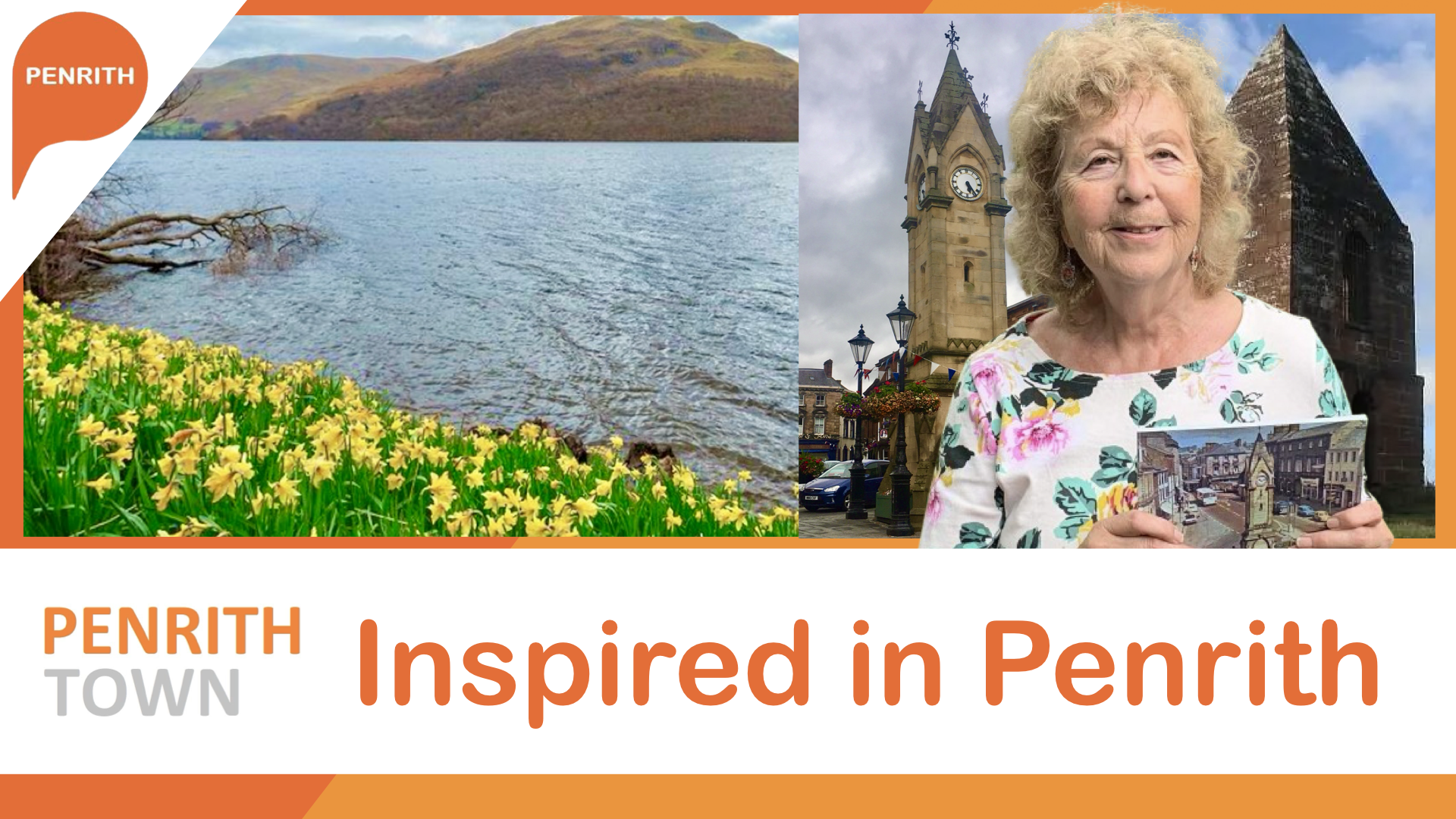
Carole Atkinson author and gardening and cooking show specialist who has featured on shows on BBC, Channel 4, Sky TV and Discovery and last year published her Penrith Town Trails book featuring her love of Penrith from the first moment she set foot in the town at the age of 18 stepped down from the London to Penrith train, with her Penrithian fiance, Jeff Atkinson in 1967.
Carole was back in Penrith recently for book signing at local bookshops and Penrith tourist information centre were her town trails is on sale.
Using the opportunity to visit Penrith Museum, Carole discovered her late husband’s grandfather’s photo in The Eamont Rovers display holding a ball and cup, as the team captain.
During her visit Carole was inspired in Penrith by the view of Penrith Beacon and the daffodils around the area to think about another author with close links to a Penrith who was also inspired in Penrith, William Wordsworth spent part of his early life in Penrith and has many associations with the town:
William and his sister, Dorothy, came to stay with their maternal grandparents in Penrith in 1776-77 whilst attending Dame Birkett’s infant school in St Andrew’s Place. They lived in a building where Arnison’s shop on Devonshire Street stands today. Another young pupil at the same school was Mary Hutchinson, who would later become William’s wife in 1802.
Penrith Beacon Hill features in The Prelude one of Wordsworth’s masterpieces. In the poem he recalls riding on Beacon Hill at the age of five.
Carole was reminded of another of Wordsworth locally inspired masterpieces, With Wordsworth’s inspiration for the poem drawn from a walk Wordsworth took with his sister Dorothy around Glencoyne Bay, Ullswater.
Inspired Carole considers in this article she wrote, Wordsworth - THE POET OF NATURE, or is there more?
“I wandered lonely as a cloud, that floats on high o’er vales and hills, When all at once I saw a cloud, a host of golden daffodils” one of his famous poems, which was one of the first poems I remember having to learn at my little convent school, St Mary’s Priory, in London. I loved it. I could imagine all the daffodils my Mum grew in our garden, but hundreds more, raising their lovely, bright yellow faces towards me. It became somewhere, I always wanted to see at Ullswater, in the Lake District, this area of natural beauty. Little did I know, one day, when I was 18 years old, my future husband from Penrith would take me there. It was his favourite place. Like Wordsworth he cycled and walked from Penrith, just to enjoy the tranquillity and the landscape on the way.
Wordsworth also loved the Lake District where he was born. Although he spent some years away, he spent 50 years of his life there, before he died on the 23rd of April 1850, 80 years old. Born near Cockermouth, his mother’s family lived in Penrith. His grandfather William Cookson owned the premises, which in latter years, turned into a well loved draper’s shop called Arnison’s in Devonshire Street. His father John Wordsworth met his mother Annie, whilst walking from Stockbridge into Penrith, where he was studying for his Articles. They married in 1766 and after having 5 children she died when William Wordsworth was only 6 years old. When John, his father died, at 42, he was 13 years old.
William had been attending Dame Birkett’s school, with his sister Dorothy. The building overlooks St Andrew’s Churchyard and is thought to be the oldest house , as it is dated beneath an upper windows. ‘R. B. 1563’. Telling us it had once belonged to Robert Bertram. The school is where he met his childhood friend and future wife Mary Hutchinson. I believe she supported and helped him, as a poet. In fact, it appears, two years after Daffodils poem, she added the last two lines- ‘They flash upon that inward eye
Which is the bliss of solitude’
What a brilliant woman. I wonder what inspired her, to finish it off, with those two lines?
It seems Wordsworth Uncle’s helped fund William and his brothers and sister’s education, as his father left them, with very little. His savings of £5,000 had been loaned to the Earl of Lonsdale, which he never paid back. A while later, it seems Lonsdale’s successor, paid it in full, with interest, after he died.
William was sent to Hawkeshead Grammar School, later went to Cambridge to study for a Batchelor of Arts degree in 1787. In 1794 he visited Penrith to see his good friend and stayed at The Robin Hood Inn, in King Street. Frequently returning to the Lake District, to be nearer his beloved sister Dorothy. They used to do a lot of walking. It seems he was no stranger to conserving the scenery around him. It is noted he often mounted the Border Beacon, to see the panoramic view, of the mountains and scenery, which was breathtaking. It appears he always believed in preserving the area. Having lived for a time in Germany with his sister Dorothy and friend Coleridge, in London and other areas, he always came back. During the French Revolution in 1792, he had a relationship with a French woman called Annette Vallon and she had a child, only discovered in the last century.
The debt owed to his father enabled him to marry his childhood sweetheart Mary Hutchinson in 1802, and they had 5 children. Two of which died aged 6 and 3. Their grief was immense. Thomas, died of pneumonia after contracting measles and his daughter Catherine had always suffered with ill health. The others were also seriously ill with measles, but they survived.
Thanks to Wordsworth poetry and his publication ‘Guide to The Lakes’, many people from home and abroad visit our wonderful part of the country. It is believed William Wordsworth created the idea of National Parks, where people can admire the landscapes and preserve their natural beauty. ‘He considered Nature as a living personality’ believing there is a divine spirit in all objects of Nature, hence they have a healing power. Perhaps, after the death of his parents so young in life and gradually losing his friends and family, he found comfort and peace, in the part of the country he loved so much. For 50 of his 80 years of life, he lived in his beloved Lake District. An early environmentalist who worked to preserve its natural beauty. In his guide, he gave warnings of planting non-native conifers that would spoil the beauty and erode the soil of the region. In 1850, he died of pleurisy in Grasmere. Three months after his death, his widow Mary gave his final poem its name ‘The Prelude’. It was dedicated to Coleridge, his friend.
Maybe Coleridge, his wife and his sister Dorothy also influenced William’s thinking and even contributed to his poems, as his wife Mary had done, by adding the final verses of his famous daffodil poem? I don’t doubt they shared their ideas, which would enhance his writing. I often wonder what Wordsworth would think of our attempts at conservation today? Introducing wildlife species, which are unsuitable and finding like the red squirrel being dominated by the foreign grey one. Pretending we’re looking after our woodlands, by cutting down those trees, which have taken many years to grow and replacing them with tiny trees and saplings, which are supposed to replace them? Added to this, we are still letting our farmers cut down our trees and hedgerows to allow them, that extra bit of land, hence depriving birds and wildlife shelter and food, let alone causing more flooding because the excess water isn’t being able to soak into the ground, drawn by the roots. Spraying our crops with poisonous substances, which we will ingest, same as our cattle and sheep. Filling in the ditches, so the roads flood. Building on the flood planes. Over populating our cities, villages and towns and wonder why there is so much discontent? Fly tipping because people now have to pay the councils and some just casually throwing it out of their car windows, because they cannot be bothered to bin, or tip where they should. And, now they are burying more nuclear waste than ever before!
I think Wordsworth was a realist as well, as a for runner for conserving what’s left of our countryside and places of interest and like many of us, would believe we can still stop all this destruction and pollution, if we act now, not wait until it’s too late. Too much emphasis is on power and money, instead of being used to keeping this country safe for our wildlife and ourselves.
 Then select "Add to Home Screen"
Then select "Add to Home Screen"